Kerala Technician Turns Organic Farmer, Earns Rs 8 Lakh From 40,000 Kg Harvest!
“My father was delighted to see me starting a farm. He even offered to bear any loss I might incur. That was the kind of love and enthusiasm he had for agriculture."
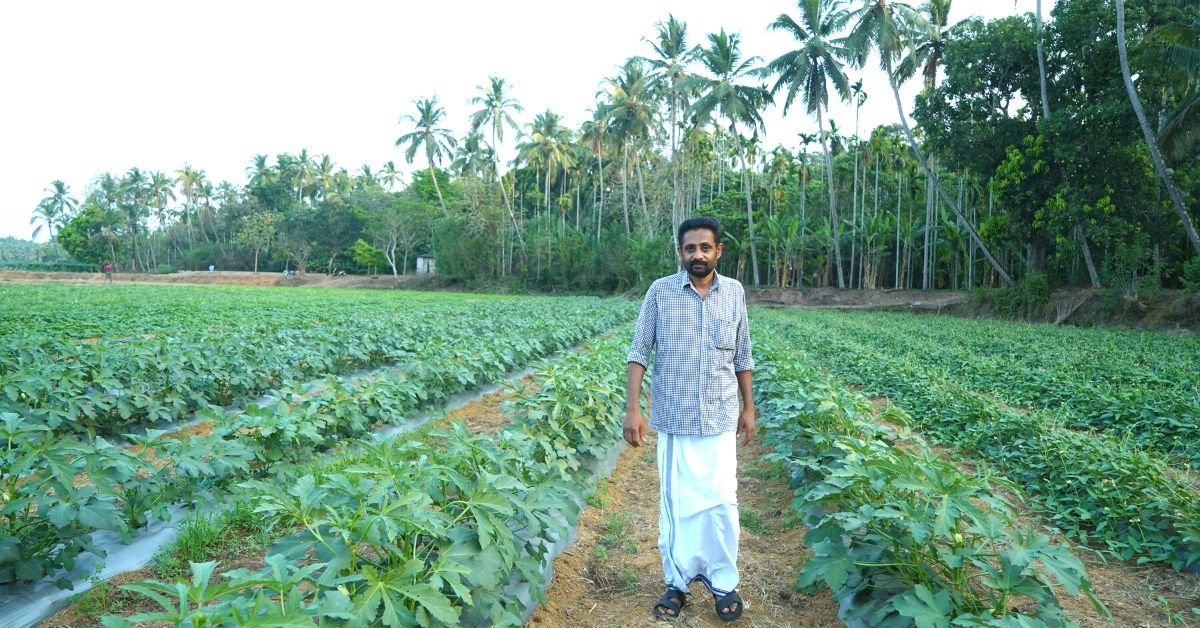
Every year, Unnikrishnan Vadakkumchery, a Thrissur-based organic farmer, generates nearly 40 tonnes of fresh vegetables from a plot of land which barely measures 1.5 acres. His cutting-edge farming methods and innovative ideas have made this possible.
In fact, in 2016, he was awarded by the Indian Council of Agricultural Research (ICAR) for this bumper harvest on a small plot.
It is thus nearly impossible to believe that until a few years ago, the same person was a novice in farming and was more invested in his computer repairing business.
Unnkrishnan’s love for agriculture fostered after he realised the satisfaction of using natural methods, and letting plants grow on their own with minimal external assistance. And such methods have indeed proven to be immensely successful for his crops.
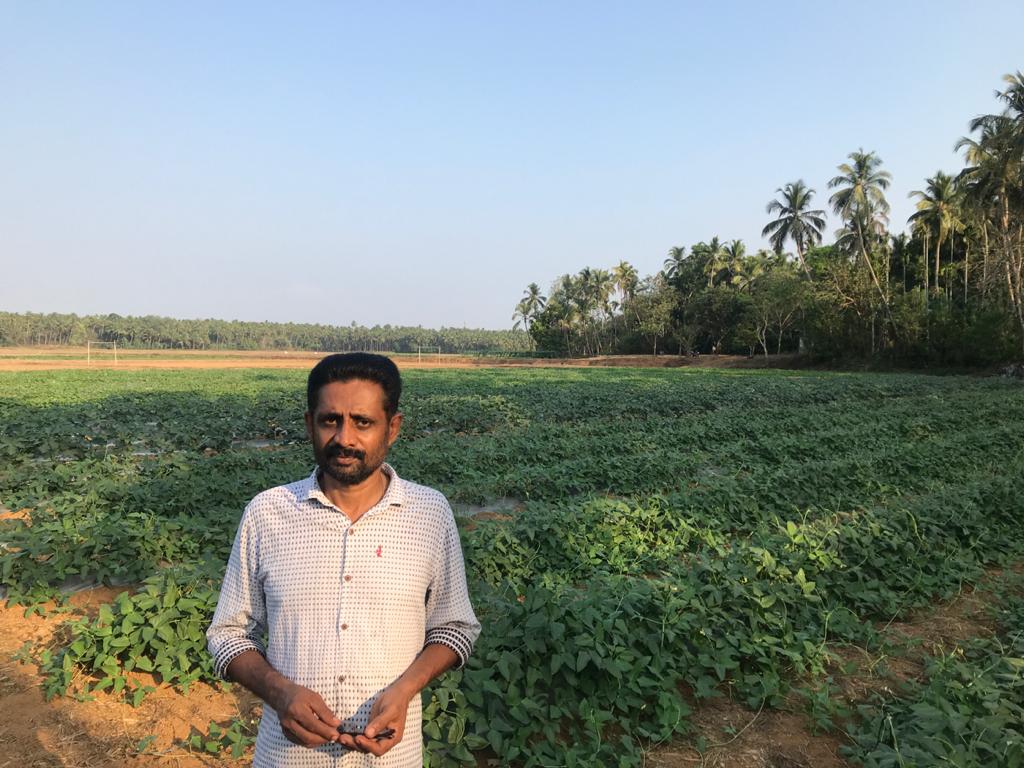
Unnikrishnan’s first tryst with agriculture
Unnikrishnan’s father Prabhakaran began farming at the tender age of 11 and tended to his crops diligently until his death at the age of 94. But, neither Unnikrishnan nor his brother Balakrishnan ever had any interest in the ancestral vocation.
While the former was a computer technician, the latter is a bank employee.
Heartbroken at his sons’ choices, Prabhakaran sold off a major portion of his land, safekeeping only 10 acres which he could manage in his old age.
Around 2012, much to his disbelief and relief, Unnikrishnan showed some interest in farming after he witnessed a few farmers growing vegetables in the paddy lands following harvest season.
“My father was delighted to see me starting a farm. He even offered to bear any loss I might incur from farming. That was the kind of love and enthusiasm he had for agriculture,” recounts Unnikrishnan. “The ancestral traits were already there, and I started sowing vegetable seeds in a 1-acre plot,” he adds.
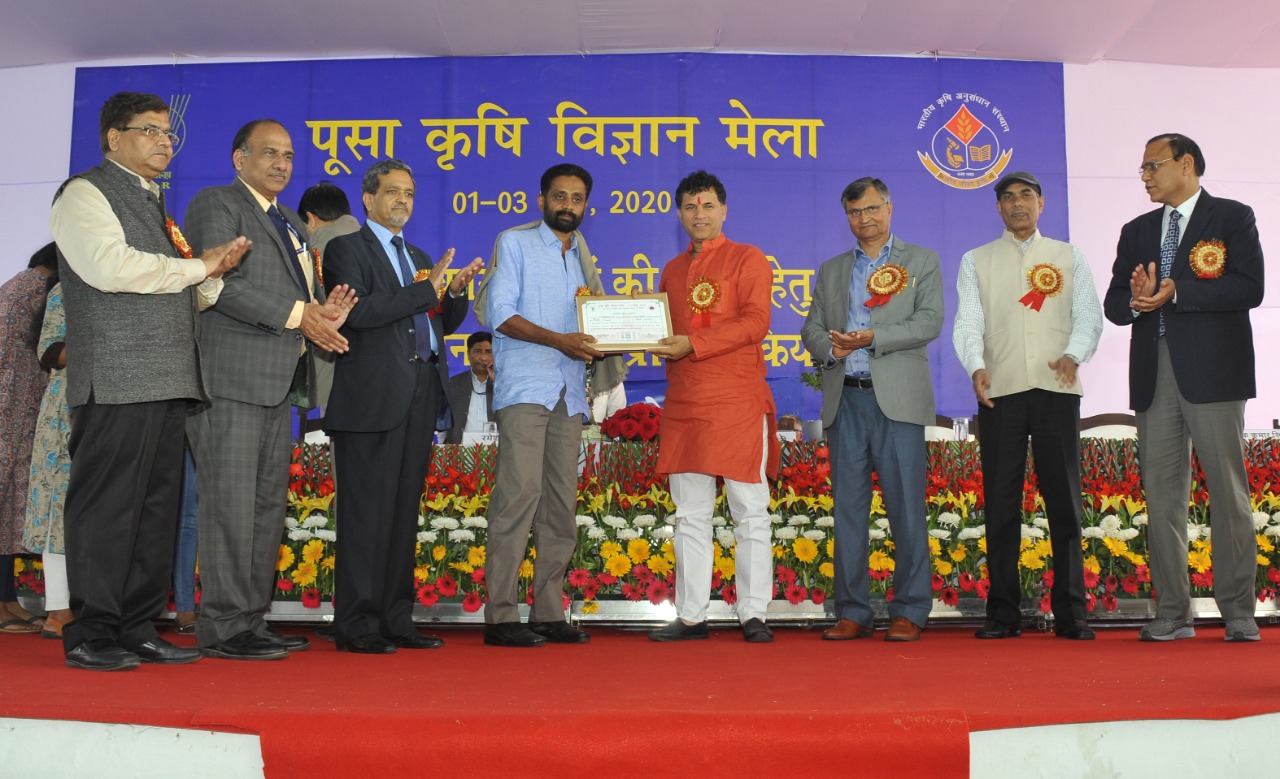
Recurring failure and the eventual turnaround
However, his first tryst with agriculture ended up in sheer disappointment.
“I was following conventional chemical farming in the beginning. But I did not get enough from it, both in terms of revenue and produce. Water intake was also copious since it was summer. My father was there to help me out. He made up the loss and asked me to try again. I did, but failed again.”
Unnikrishnan was ready to give up farming entirely when he chanced upon a TV programme on precision farming in 2013. Soon, he procured all the necessary types of equipment from Tamil Nadu and tried his hands at the technique. The yield did improve, but for some reason, he failed to sell the produce or secure a reasonable price for his vegetables. He was frustrated and disheartened.
It was a chance encounter with Dr P Jayaraj, Head of the Krishi Vigyan Kendra (KVK), Kannur, that changed his life completely.
Dr Jayaraj reveals, “I was attending a farming convention in Thrissur, where I spoke about how the nutritional deficiency of the soil leads to abnormally-shaped vegetables and fruits. One person from the audience countered my logic. It was Unnikrishnan.”
The technician-turned-farmed complained to the agricultural scientist about the lack of market for organic vegetables and rejected his claim about plant health.
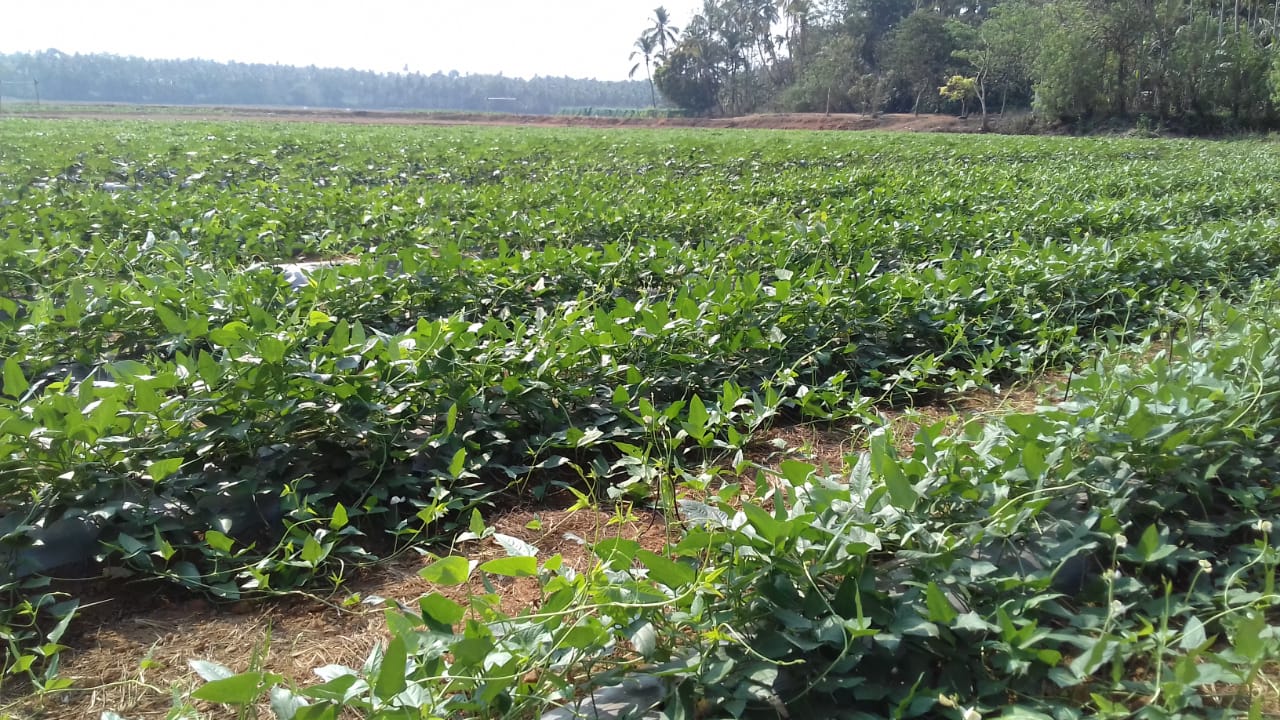
“The vegetables in your farms are not in the right shape, are they,” Dr Jayaraj asked him in response, and Unnikrishnan was left speechless.
Later that afternoon, Dr Jayaraj managed to squeeze a little time in his packed schedule to drop in on Unnikrishnan’s farm. Braving the scorching heat, he examined the vegetable plants meticulously and offered some salient advice.
“By that time, his crops had already been given the initial shock of rich organic manure and other supplements. Although natural, the administration in unscientific quantities led to the imbalance of macro and micro-nutrients in the vegetables—the main reason his produce was misshapen and was not finding any market,” shares Dr Jayaraj.
He instructed Unnikrishnan to adopt a trial farming method for three weeks, which does not need any bio-pesticides or heavy deposition of manure. Three weeks later, Unnikrishnan’s enthusiastic feedback to Dr Jayaraj confirmed that the farmer had finally found the farming method best suited for him.
Apart from Dr Jayaraj, Dr Narayanan Kutty from the Kerala Agriculture University, also gave valuable advice to Unnikrishnan. As per his advice, he practises shift cultivation round the year, where he sows vegetable seeds in the initial 50 cents of land (approx. 0.5 acres). Once these are near-ready for harvest, he prepares the seedbed in another 50 cents. By engaging in this method, he can grow a wide variety of seasonal vegetables throughout the year. This way, he can manage to harvest vegetables three times a year. He also practises some vertical farming of long beans and bitter gourds
Award-winning agricultural methods
Presently, Unnikrishnan grows vegetables in his one and half-acre plot. The rest eight and a half-acre land is dedicated to the family’s traditional farms of coconut, areca nut, nutmeg, fruit orchards and paddy.
The man believes that the key to his success lies in soil management and scientific cultivation. “I learnt the scientific know-how from agricultural officers and researchers, who told me to always check the soil pH before sowing.”
He now adjusts the soil pH value using lime, dolomite or potassium humate, according to the need of the plant. The sowing of the seeds is also done in a curious manner to ensure the best germination conditions.
He inserts a mixture of organic goat manure, chicken manure, neem cake and vermicompost to set the seedbeds. The beds are then covered with polythene mulching sheets, perforated at specific intervals through which the saplings can come out. Drip irrigation ensures accurate supply and lesser wastage of water.
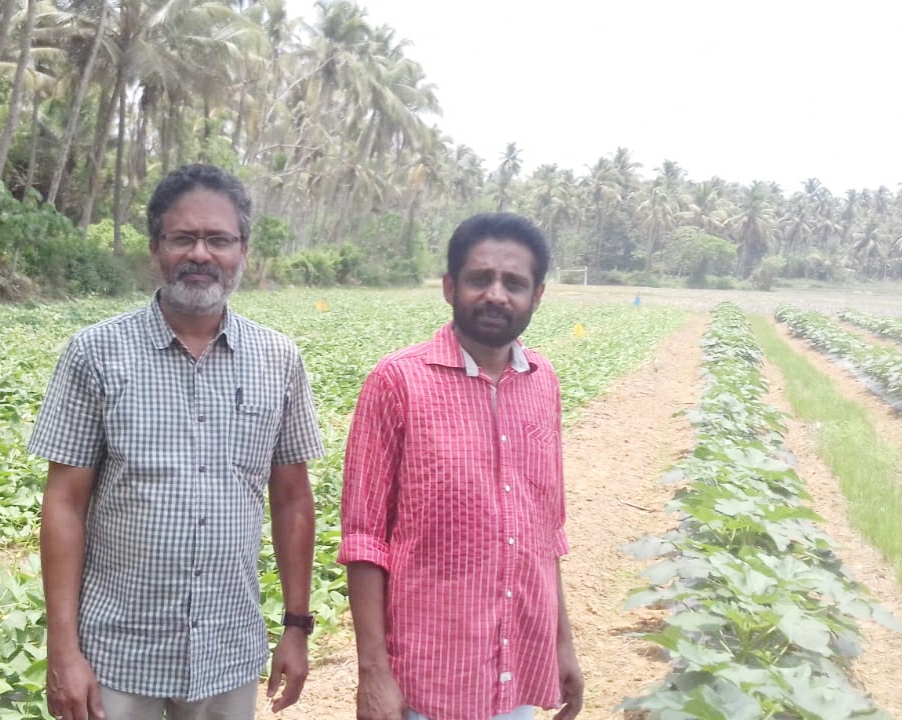
“Checking the soil at regular intervals is another important step I take. Based on the results, I make sure that the right nutrients are supplied to the soil in the right amount. This has helped me in effective crop management and has reduced the input cost considerably,” informs Unnikrishnan.
After administering the right nutrients in the right quantities, he has observed a discernible difference in the plants. The leaves are now always green, healthy and uniform. The greatest advantage was the surprising drop in pest attacks, which is now almost negligible. The vegetables and fruits are uniform in size, and shelf life is much longer.
Every year, Unnikrishnan sells around Rs 10-11 lakh worth of vegetables, bringing in a profit of nearly Rs 8 lakh. His total harvest includes around 30 tonnes of vegetables and 10 tonnes of paddy. He proudly mentions that the supermarket chains come to him seeking his vegetables; he does not have to approach anyone to sell his produce.
Both Unnikrishnan and his mentor Dr Jayaraj believe that though many farmers are adopting organic ways nowadays, they suffer an initial loss of 30-40% in produce due to the lack of scientific knowledge and ill-conceived notions about soil supplements. Unnikrishnan now serves as an ideal exemplar for organic farmers in his surroundings and has inspired many to adopt the method in the most scientific manner.
Also Read: ‘The Organic Women of Changali Wala’, The Force That Transformed a Remote Punjab Village
(Edited by Gayatri Mishra)
Like this story? Or have something to share?
Write to us: [email protected]
Connect with us on Facebook and Twitter.
If you found our stories insightful, informative, or even just enjoyable, we invite you to consider making a voluntary payment to support the work we do at The Better India. Your contribution helps us continue producing quality content that educates, inspires, and drives positive change.
Choose one of the payment options below for your contribution-
By paying for the stories you value, you directly contribute to sustaining our efforts focused on making a difference in the world. Together, let’s ensure that impactful stories continue to be told and shared, enriching lives and communities alike.
Thank you for your support. Here are some frequently asked questions you might find helpful to know why you are contributing?


This story made me
-
97
-
121
-
89
-
167













